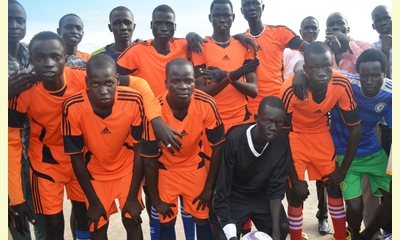|
|
The soccer team you won’t see at the World Cup (Uganda)
un article par Oxfam America
The following has been adapted from a story written by Dorah
Ntunga, Oxfam Novib (Netherlands), Information, Media &
Communications Officer in Uganda. 
Fired up by the World Cup, members of a local soccer team in Uganda get psyched for a match in Arua, where many South Sudanese refugees have fled for safety. Photo: Dorah Ntunga/Oxfam
click on photo to enlarge
As 32 countries compete for the World Cup title in Brazil, a different
kind of tournament is taking place in northern Uganda. There, in
the districts of Arua and Adjumani, young South Sudanese refugees
have formed soccer teams to play for peace.
They are among more than 400,000 people who have fled South
Sudan since fighting broke out there in mid-December. The conflict
has dragged the world’s newest nation into a food crisis that
threatens nearly four million people. Inside the country, more than
one million people remain displaced.
“I never expected to end up in such a situation. I miss Bor, school,
and my friends,” says 18-year-old Manyangson Ngong, the captain
of the Lucky Start team from Ayilo settlement in Uganda. The
fighting in South Sudan cut his studies short in Bor.
Ngong is not the only young person trying to cope. Of the more
than 110,000 South Sudanese refugees in Uganda, 65 percent are
under 18. With no schools for them to attend, these young people
have had little to do, and often wind up fighting with each other.
The soccer tournament is a refugee-initiated attempt to break that
cycle.
To help, Oxfam has been helping to distribute soccer balls. It’s part
of our work with two partner organizations: Community
Empowerment for Rural Development (CEFORD) and Agency for
Cooperation and Research in Development (ACORD). The work
includes supporting the formation and strengthening of peace
committees made up of refugees and the communities that are
hosting them.
“A few of us started by kicking a handmade ball within the
settlements,” says Ngong, explaining how the games first started.
“Many youths showed interest to join us and before we knew it, the
numbers had grown. We then decided to ask for space where we
created a football pitch. With football, we are kept busy not to think
over the bad situation and pain. Many other teams have been
created. We are all from different tribes including the host
[Ugandan] community.”
The biggest challenge, says Ngong, is allowing everyone to play
since there are not enough balls or uniforms to differentiate who is
on which team.
“It feels bad stopping someone from joining the teams when they
want to. We have tried to divide the teams to ensure everyone has a
chance to play,” he says. “With more support, hopefully we can grow
stronger and start playing friendly matches with other refugees and
teams within the districts. Who knows? I might meet some of my old
friends among the teams.”
[Thank you to Janet Hudgins, the CPNN reporter for this article.]
|








|
DISCUSSION
Question(s) liée(s) à cet article:
How can sports promote peace?,
* * * * *
Commentaire le plus récent:
[Editor's note. The following article was sent in to CPNN by Ron Davis, Assistant Coach Cross Country / Track and Field
The Ohio State University. ]
'Lost Boy of Sudan' still running at Northern Arizona
By Bob Baum, AP Sports Writer
FLAGSTAFF, Ariz. — Lopez Lomong was 6 years old when, in the dark of night, he and three older boys crawled through a small hole in a fence and ran barefoot for three days to escape their Sudanese rebel captors.
Sixteen years later, in the pines of Flagstaff with a comfortable life he never imagined, he is running still. . .
Next week, Lomong, a sophomore at Northern Arizona University, will be among the favorites in the 1,500 meters at the NCAA track and field championships in Sacramento, Calif.
"I have to picture myself when I was six years old, running from the death I saw. " he said. "God brought me over here safe and gave me the opportunity and ability to run. . ... continuation.

|
|









